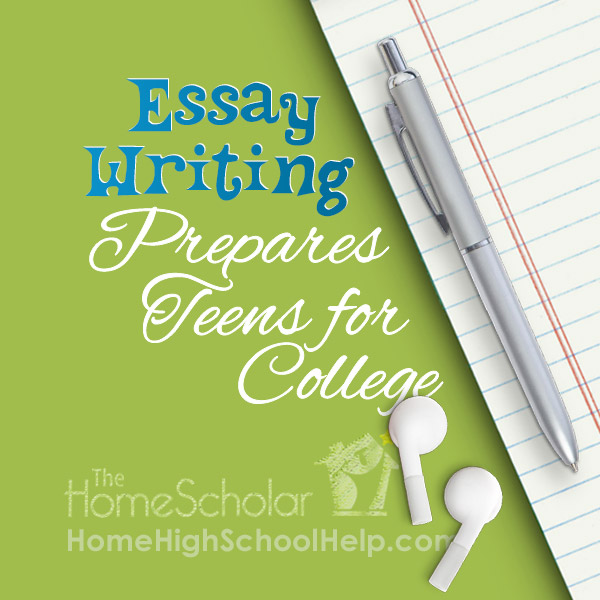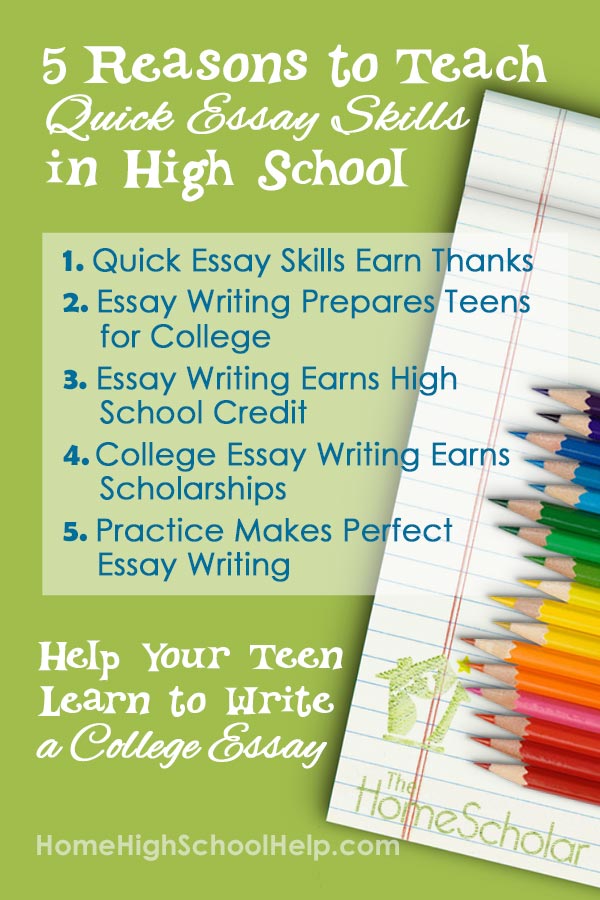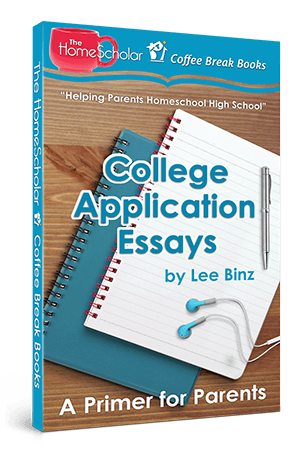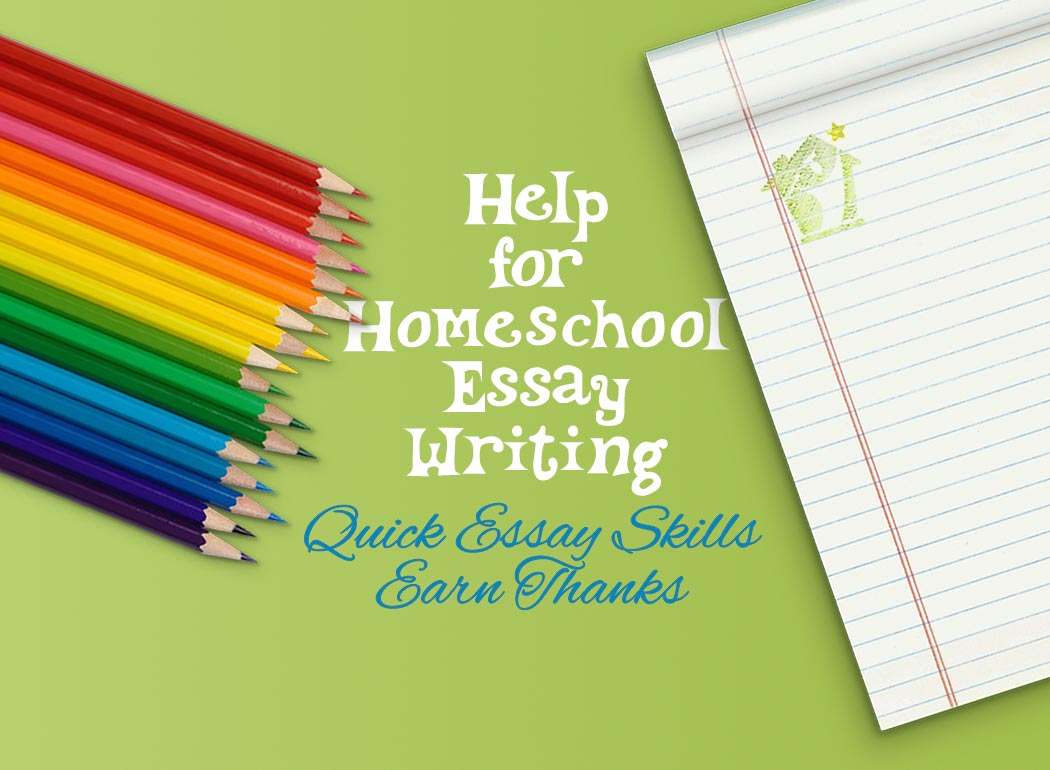College Essay Writing Skills Earn Thanks
What would you give to hear these words? Wouldn’t you just love to get some recognition and thankfulness years from now, when your child is all grown up? It can happen! With a little time and distance, your hard work can pay off and your child may come home and thank you.
During my son’s first week at college, he came home and thanked me for a specific skill he learned when we were homeschooling. Believe it or not, he thanked me for teaching him to write a quick essay. What a surprise after all that complaining when he was in high school!
You see, a week into his transition to the university, his professor gave an essay test. My son Alex said the other students were somewhat freaked out by the all-essay format of the two-hour test. Suddenly our college essay writing preparation paid off in a real-life situation. Because we had so carefully prepared our students to write short essays under high pressure situations, Alex wasn’t bothered by the test at all. It felt like a fairly common, ordinary, school situation. He recognized that this was only because we had worked on the skill in our homeschool, and he thanked me for it.

College Essay Writing Prepares for College
Learning to write a quick, 30-to-50-minute essay is an important part of college preparation for two reasons. Alex picked up on reason number one—colleges often include essay tests. A spontaneous quiz, make up exam, or planned test might include essays during any part of the college experience.
Perfectly written and carefully edited papers are also part of the college experience. Those carefully researched, planned, and coordinated papers are different from a quick spontaneous essay. However, there are times when a college student has not planned ahead, and their success may depend on a quickly-written paper. Other times, when serious writer’s block sets in, having quick essay skills can help students overcome the blank page, and get a paper started. Quick essay skills can pay off, even with the variety of papers students experience in college.
The second reason for practicing quick essay skills is a little more immediate for homeschoolers. Kids need the skill to score well on ACT® and AP® Tests. The ACT® test contains an optional short essay, but some colleges require the essay section of the test for admission.
Many colleges rely on SAT® and ACT® test scores to indicate college readiness. The essay section of the ACT test can demonstrate your child’s ability to write as well as provide outside documentation from a third party. Test scores can determine the quality of college that will accept a student. The ACT essay section provides a writing prompt and the student must read the prompt, outline their thoughts, and write an essay in the time allowed. The essay is handwritten in the exam booklet and is scored by a teacher, not computer.
Handwriting is important, but not because of penmanship. The essay simply needs to be legible even though it is written quickly. There is no particular style of penmanship required. By the time children reach high school, they have usually developed their own penmanship style, which is fine as long as it’s legible.

College Essay Writing Earns High School Credit
Learning to write a quick essay is not only helpful in the long run, it can be a major component of your high school English class. A high school English credit can be awarded when your child has completed about 120 to 180 hours of work. You don’t have to painstakingly count up every single hour though, you can easily estimate hours. If your student works at least an hour a day on a subject, it will typically add up to one high school credit. If they work half an hour a day, they will earn a half credit.
Your English class could include teaching your child to write a quick essay as the cornerstone of their composition studies. Get your child to work for about one hour a day on writing skills. This can include writing quick essays, instruction in writing essays, and brainstorming essays. You may want to include other learn-to-write activities such as worksheets, vocabulary workbooks, journaling, spelling, grammar, or watching videos about how to write an essay.
For a full high school English credit, include both writing and reading daily. It doesn’t matter how many books your child reads—6 books to 600 is all within the range of normal. Don’t worry about literary analysis, because not every English class needs to include analysis. You have the freedom to focus on reading for enjoyment. Try to choose books from a College Bound Reading List, and mix in some popular literature for teens.
This post contains affiliate links. If you click and buy I make a few pennies, but not enough for a latte.

College Essay Writing Earns Scholarships
Second, your child may earn scholarships from a college by having great test scores that include essays, like the AP® or ACT® with essay. Universities frequently tie financial aid to test scores, giving an additional financial incentive to study quick essay skills. Studying for these college admission tests, and learning how to write any required essay, can improve your child’s chances of earning college admission and scholarships. All AP exams are essay tests, so knowing how to write an essay is closely tied to success in these tests.
Third, many private scholarships are awarded as a result of essay contests. Considering the cost of college today, it’s definitely an idea worth pursuing. The process for finding private scholarships is not easy, and it can be time-consuming. After locating scholarship opportunities, filter them down to those that best fit your student. After filtering, arrange the essay competitions by due date, and carefully track the requirements and your student’s progress. Follow-through is done by the student. As the parent, you can do a lot of the legwork for scholarship applications, but your student must ultimately write the paper or produce the product. It’s hard work, which is why they get high school credit. Hopefully they will also earn college scholarships!
Learn How to Write a College Essay
For instruction in essay writing, The Institute for Excellence in Writing was a perfect fit for my family. We used the Advanced Communication Series. They have a newer, longer version called the High School Essay Intensive. These are video instruction for the student, not for the parent. I made sure my students watched the video instruction twice a year, beginning English in the fall, and again at the mid-winter break. We used it two years in a row, and I definitely felt like I’d gotten my money’s worth. After watching the video, my children were ready to try their new skills.
There are many books that include essay prompts. I used a book called, 501 Writing Prompts by Learning Express. It’s a simple, inexpensive book filled with perfect prompts for short essays. Beyond prompts, it provides some guidance for evaluating essays. 501 Writing Prompts also includes model essays for all of the bold-faced prompts throughout the book (once every 25 prompts or so). The samples show you a top scoring essay, a middle-of-the road essay, and a low scoring essay. You can look over these sample essays to see how your student’s writing compares. No rubric needed.
Because this book was intended for the general population, it includes some edgy prompts related to public school attendance that may not be appropriate for some homeschool families. Look through the writing prompts book to find an appropriate essay topic for your students.
If you prefer a book that is more similar to the specific prompts on the ACT® Test, or the AP® Exams, choose a specific study guide for the test. These are my Recommended Study Guides for High School Test Prep.

Practice Makes Perfect Essay Writing
Their writing practice was helpful in other high school classes as well. I used quick essays to document many of our other courses that did not have tests, creating my own prompt from homeschool subjects. At times I used essay topics from the history curriculum, art, PE, music, or electives. If a topic from the writing prompts book reminded me of another subject, I tweaked it a bit to obtain an essay that fit what we were studying.
When my children were finished the essay, it provided written documentation for these classes. I could include those essays in course descriptions. It was a way for me to evaluate my children in different subjects when I didn’t use tests and provided great documentation for hard-to-document subjects.
Real success in writing a quick essay comes with practice. Once your child learns how to write reasonably well, additional writing skill will come through practice. Practice leads to success, which can help them get great grades in college and succeed in life. If nothing else, they will become a good writer and can use these communication skills in any future calling or career.
Thankful for Homeschooling
It wasn’t all fun and games with my children, either. I remember how difficult the concept of being timed was for them. Kevin started the year by spending his first few minutes of each essay talking about how it wasn’t possible to write an essay in so little time. “I understand it’s challenging, but you have 49 minutes left,” I replied. After about three or four minutes of complaining, he figured out the clock was still ticking and would get busy.
We worked aggressively on essay writing using this strategy for both sophomore and junior years. I wanted to prepare my children for college and I was concerned about the essay portion of their admission tests. I was thankful we had included essay writing in our homeschool.

Recommended Resources

Practice essay writing in high school with these 75 prompts. Application essay prompts and tips for homeschool parents preparing teens for college admission and scholarships.
Junior year is the BEST time to practice your college application essays! You can use those topics to practice your essays, and have time to make them perfect before they are submitted to college during the senior year application process.
Practice writing application essays within your regular English studies. You can include this in your homeschool writing assignments during junior year, or even before if your child can write a descriptive essay.

The high school home stretch can be particularly stressful for homeschoolers and their parents. If college is in the future, parents worry about how their students will do when writing those intimidating application essays. If multiple universities are being considered, the problem just compounds itself.
Lee tackles your toughest questions and shows you how to "project manage" your way to application essay success! It is not enough for parents to take a totally hands-off attitude toward these all-important essays, nor is it advisable for them to take total control of the process. The trick is finding that balance, and that's where Lee can help!

Homeschoolers often have a different path into college than traditionally schooled students. Unlike what happens in public schools, I believe YOU are your student's best high school guidance counselor and can become your student's best college admissions coach (just think of the student to guidance counselor ratio alone).
You are the person who LOVES your child and you are the most motivated to help them succeed at college. In addition, you don't have to rely on an overworked school guidance counselor or an overpriced admission coach. You can do it yourself - Let me teach you how!

 Login
Login


